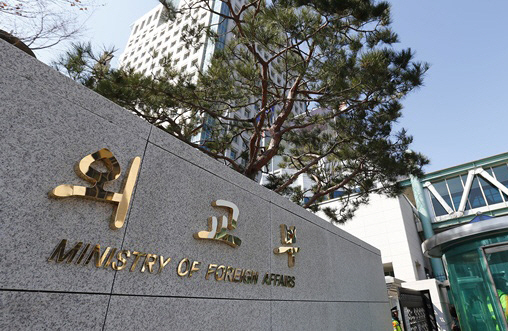 |
Ministry of Foreign Affairs (Yonhap) |
South Korea on Saturday called on Japan to make “genuine efforts” to heal the wounds and restore the dignity of the women who were forced into sex slavery during World War II, after Seoul’s recent court ruling on the issue drew a strong rebuke from Tokyo.
In a statement, the Foreign Ministry here acknowledged that the 2015 bilateral deal on the victims – euphemistically known as “comfort women,” was an official agreement, and thus said Seoul will not seek any additional claims at the government level.
But it said Seoul has neither the right nor the authority to stop victims from further raising the issue, adding that the problem cannot be solved solely by intergovernmental agreements that do not reflect the wishes of the victims.
“Our government will continue efforts to resolve the issue by consulting with the victims, but Japan should also show genuine efforts to restore the victims’ honor and dignity and heal their wounds, based on the spirit of responsibility, apology and remorse it has expressed earlier,” the ministry said.
Earlier this month, a Seoul court ordered the Japanese government to pay 100 million won ($90,000) each to 12 plaintiffs -- Korean victims of sex slavery and victims’ bereaved family members -- as compensation for the mental distress and financial losses they suffered as a result of Japan’s wartime atrocities. In the country’s first decision regarding a civil lawsuit filed by comfort women against Japan, the court said the existing deals between governments in Seoul and Tokyo do not prevent individuals from seeking compensation.
The court’s decision became final on Saturday as Tokyo decided not to appeal, with Japanese Foreign Minister Toshimitsu Motegi saying the ruling is “extremely regrettable and utterly unacceptable.”
Motegi reiterated earlier calls for Korea to promptly take action to correct what he called a breach of international law.
Tokyo maintains that the lawsuit should be dismissed on the grounds of sovereign immunity -- a principle of international law that prevents one country from being sued by another without its consent.
The Seoul court, however, rejected Tokyo’s view, saying this principle does not apply to “systematic crimes against humanity.”
Japan has also insisted that all claims related to Japan’s colonial past, including the other thorny issue of Koreans being forced to work in Japanese factories, were settled under a 1965 treaty that normalized bilateral relations. It also asserts that the 2015 agreement had “finally and irreversibly” resolved the sex slavery issue.
The latest ruling made it possible for Seoul to seize Japanese government assets and use them for reparations, but observers raised concern that its actual execution could be difficult.
The Japanese Embassy in Seoul is inviolable under the Vienna Convention on Diplomatic Relations, which means the plaintiff would have to locate other Japanese government assets that could be seized and liquidated.
By Ahn Sung-mi (
sahn@heraldcorp.com)





![[Exclusive] Hyundai Mobis eyes closer ties with BYD](http://res.heraldm.com/phpwas/restmb_idxmake.php?idx=644&simg=/content/image/2024/11/25/20241125050044_0.jpg)
![[Herald Review] 'Gangnam B-Side' combines social realism with masterful suspense, performance](http://res.heraldm.com/phpwas/restmb_idxmake.php?idx=644&simg=/content/image/2024/11/25/20241125050072_0.jpg)

